7 Best Centerpin Rods Of 2025
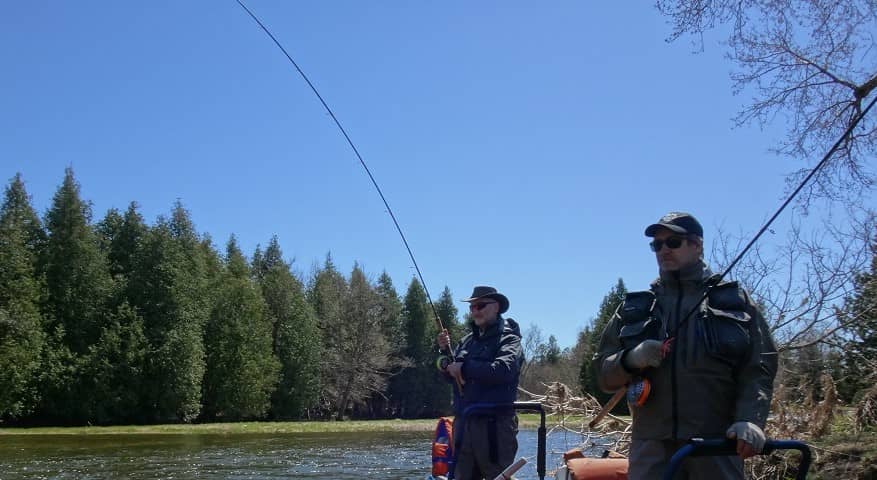
I’ve been a guide and instructor of Centerpin fishing for 22 years, and I have also been Centerpin fishing for over 34 years. During that time, I had the opportunity to try dozens of Centerpin rods, from low-budget rods to high-end rods and everything in between.
I have also sold Centerpin and Float rods in my tackle store and worked with many river guides that use these rods, so I’ve had lots of feedback, which I’ll share with you here.
This article covers 7 tested and proven rods for centerpin and float fishing, including a new one that hit the market in 2024 that fits anyone’s budget that is getting great reviews. There is also a list of some float rods you could use with spinning reels.
I’ll also discuss, rod sizes, types of handles and why I prefer one over the other so you know what to buy for your type of water.
In a nutshell:
The best rod for you is the one that is suitable for the type of river that you fish, as well as the type and size of fish that you fish for, and the rod that fits into your budget.
Before you buy a rod, I want to emphasize that a skilled angler will catch ten times more fish on a cheap $100 rod than a new angler would catch on a $1500.00 rod.
Skill trumps all, so don’t feel pressured to buy something beyond your budget.
I may earn a commission from the affiliate links on this site, which is at no cost to you. Learn More
The Best Centerpin Rods / Float Rods: Quick Picks
These are my quick picks for the best centerpin float rod.
- Lamiglas “The Closer” Best-Rated Rod
- Raven IM8 Float Rod – Guide Recommended Rod
- Shimano Clarus – Best Budget Rod
- New 2024/25 Rod – See Below
Keep reading to see others worth checking out.
Before You Choose A Centerpin Fishing Rod, Consider This:
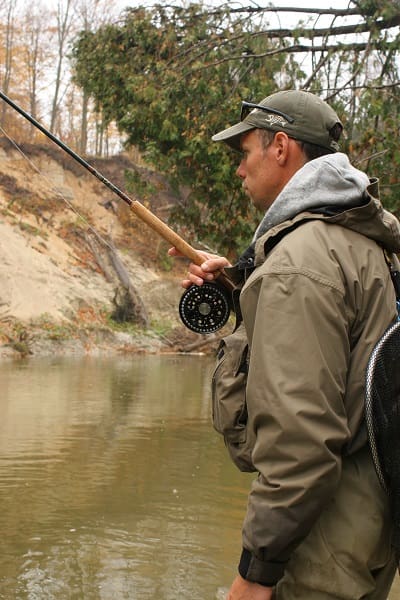
If you want to maximize your success on the river, you will need a rod that is the correct length, the right stiffness both in the lower rod and in the tip, and the right power for where you fish.
You also need to consider the type of fish you will be using it for.
You want a rod stiff enough to be able to get a solid hook set at long distances, yet soft enough to protect your light leaders.
The Best Rod Length
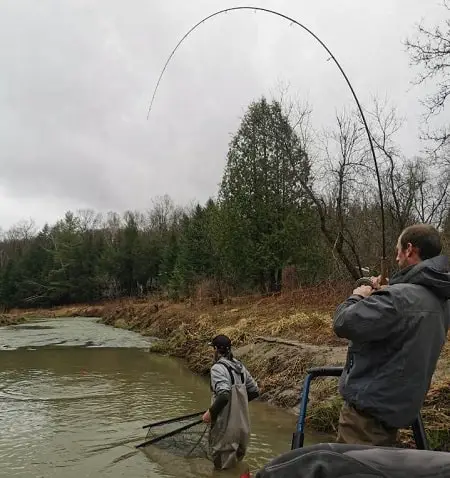
Centerpin fishing rods, which are also known as float rods, are long and often between 11 feet and 14 feet; however, some rods can be up to 16 feet long.
There are many benefits to a long rod.
There is a time and place for different rod lengths, and the best rod length depends on the type of water you will be fishing.
The long length allows the angler to keep the line up off the water longer, which gives the angler a better ability to control the float and get a better drift.
The long rod also acts like a giant shock absorber, which protects the leader on hard hook sets and also when fishing big fish on light leaders.
The longer rods have the advantage of fishing deeper water with a fixed float. A fixed float is one that does not move on the line unless you manually move it.
Best Rod Length For Smaller Rivers
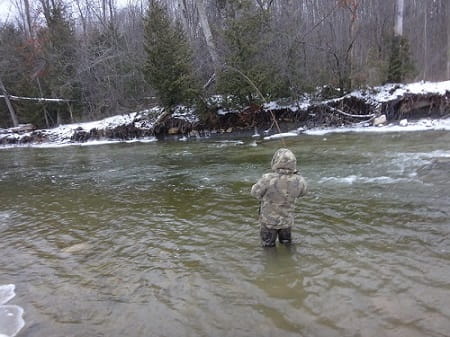
If you fish a lot of smaller rivers that are not very deep with lots of brush to walk through, the best rod would be a shorter rod of 10 to 11 feet. A rod this size is better for getting through the brush, and since it’s a smaller river, you won’t need to make a lot of really long casts or long drifts where you need to keep the line up off the water for long.
Best Rod Length For Medium-Sized Rivers
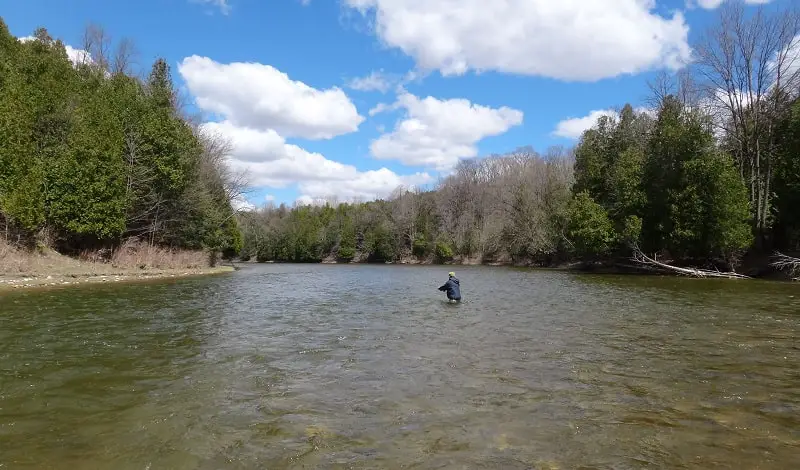
On a medium-sized river of up to 60 feet across, the best length would be between 12 and 14 feet.
A 13-foot rod is my go-to rod for almost all rivers around the Great Lakes region.
Best Rod Length For Large Rivers
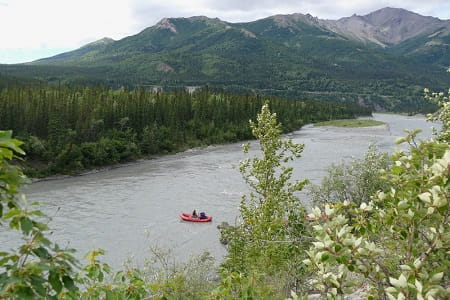
For very large rivers like the Niagara River or on larger West Coast rivers that are a hundred feet or more wide, and have very long runs with deeper water, I think the best rod would be between 14 and 15 feet long.
But this long rod is best reserved for bigger rivers since very long rods can have some disadvantages.
Remember, the longer the rod, the heavier it will be, and often it will be tip-heavy, which can become hard on the wrists, arms, and shoulders after a long day of fishing.
Another disadvantage to longer rods is getting through tight forests and bushes.
A tip is to break your rod down into 2 to 3 pieces when you need to go through the bush. This will prevent you from hanging up on trees or breaking your tip.
Best Centerpin Fishing Rod Action And Size
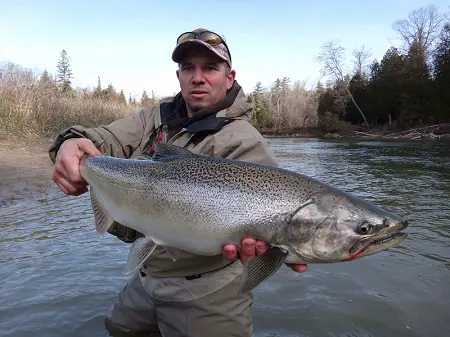
Centerpin float rods come in different weights or line sizes and different rod actions. A rod with a heavy line rating may be too stiff for what you want to do.
Some rods are so soft and whippy that your hook sets will suffer, and some rods are so stiff that you will break more fish off.
The action of the rod is determined by the blank design and the taper, as well as the type of graphite or material used in its construction.
The best rods for Centerpin fishing are made with high modulus graphite that are stiffer in the right places, such as lower near the handle for more power when fighting big fish, but are softer where needed, like near the tip to protect light leaders and for preventing small hooks from pulling out.
The best rods for Centerpin fishing will be the ones that are well-balanced, light in weight, and use good components.
Some anglers will tell you to go with heavier rods because the fish are bigger, and these heavier rods will have enough backbone to really horse the bigger fish in. Unfortunately, that’s not always the best advice.
It’s not always the size of the fish that you need to think about when you consider the right weight of the rod.
As an example, if you fish in slow, clear water, you may need to use very light leaders just to get the big steelhead to bite.
If you use light leaders, it doesn’t matter how big the fish is and how much power your rod has, because you can’t use all that power with those light leaders, or you will just break the fish off.
Think about your leader size before you buy a rod. If you use 6-pound to 8-pound leaders all the time, having a medium-heavy rod rated for 10- 20 pounds is a waste.
You need a rod that is best suited to your leader size, and your leader size will depend on the type of water that you fish.
On big, fast-flowing rivers, you will likely be able to get away with heavier leaders, so a heavier rod is a benefit to help turn those big fish in fast currents. The big West Coast rivers and some of the biggest Great Lakes rivers are best fished with a heavier rod with an 8 to 14-lb line rating.
On smaller streams that are clear and only two to 40 feet wide, you will probably need lighter leaders, especially in slower currents. Therefore, a 4 to 8-pound line rating is best.
The best float rods will have line ratings listed on them, and you will want to get a rod suitable for where you fish the most. See the chart below.
Centerpin Rod Size Chart
Type Of River | Steelhead | Salmon - Rod Weight | Trout - Rod Weight |
Very Large Rivers | - Length 14, 15 and 16 foot - Action - Medium or Medium Light - Line 10 -12lb / Lure 1/4 - 1/2 oz. | - Length 15 foot - Action - Medium or Medium Heavy - Line 10-12lb / Lure 1/4 - 1/2 oz. | - Length 15 foot - Action - Medium Light - Line 6-10lb line / Lure 1/4 - 1/2 oz. |
Medium Average Rivers | - Length 12 - 14 foot - Action - light to Medium Light - Line 8 -10lb / lure 1/8 - 1/2 oz. | - Length 12 - 14 foot - Action - Medium or Medium Heavy -Line 10 -12lb line - lure 1/4 - 1/2 oz. | - Length 12.6 - 13.6 foot - Action - Light to Medium Light - Line 6-8lb /Lure 1/4 - 1/2 oz. |
Small Rivers an d Creeks | - Lenght 10.6 - 12 foot - Action - light to Medium Light - Line 8-10lb / lure 1/8 - 1/2 oz. | - Lenght 10.6 - 12 foot - Action - Medium to Medium Light - Line 10 -12lb / lure 1/4 - 1/2 oz. | - Length 9 - 11.6 foot - Action - Utra Light to light - Line 4-6lb |
Larger steelhead - West Coast Fish | - Line 8-14lb - Action - Medium or Medium Heavy | - Line 12-18lb - Action - Medium or Medium Heavy | N /A |
Pier / River Mouth | - Lenght 14 - 15 foot - Action - Medium or Medium Light | - Lenght 14 - 15 foot - Action - Medium or Medium Heavy | N /A |
Best Multi Purpose Rod - Great Lakes Region | - Lenght 13 foot - Action - Medium or Medium Light | - Lenght 13 foot - Action - Medium | - Lenght 12 foot - Action - Light or Medium Light |
Best Rod Handle Type For A Centerpin
There are two main types of handles that you will need to choose from. Each handle offers anglers different advantages and disadvantages. The two handles are the Fixed Reel Seat and the Sliding Rings Handle.
Fixed Reel Seat Rod
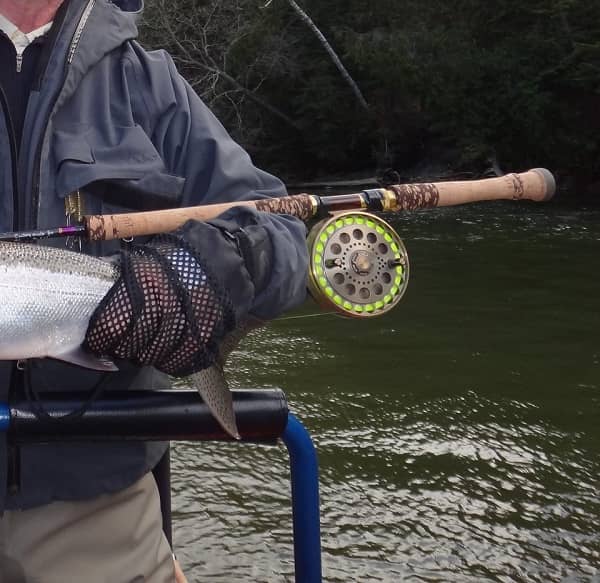
The fixed reel seat handle is similar to that of a spinning rod or a baitcast rod in that the reel seat is built right into the handle of the rod.
The advantage of this type of handle is that it is a very secure connection of the Centerpin reel to the rod, and the reel seat adds a bit of weight, so the rod may not be as tip-heavy.
The disadvantage of this type of handle is that you can not adjust the position of the Centerpin reel on the handle to get a better rod/reel balance or to get a more comfortable grip.
Some anglers like me prefer a longer butt section with the reel higher up on the rod handle, while other anglers prefer less butt section and like the reel closer to the butt of the handle. Most fixed reel seats are set somewhere in the middle and can not be adjusted for comfort or balance.
Sliding Rings Reel Seat
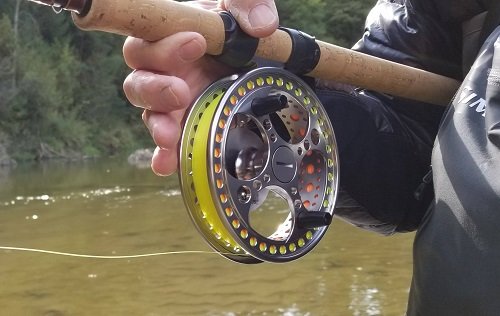
The sliding rings real seat is my preferred option for a number of reasons.
There are lots of different float reels on the market, with some that are very lightweight and some that are heavier.
Because of this, it’s easier to balance out the rod with the adjustable sliding rings.
I also prefer a longer butt section for better hook sets and more power or leverage when fighting big fish, so putting the reel at the top of the handle near the rod blank is better.
The picture above shows the reel high on the handle and the butt section under the armpit, which allows for better balance, less wrist fatigue, and more torque when fighting fish. This is my preferred reel position.
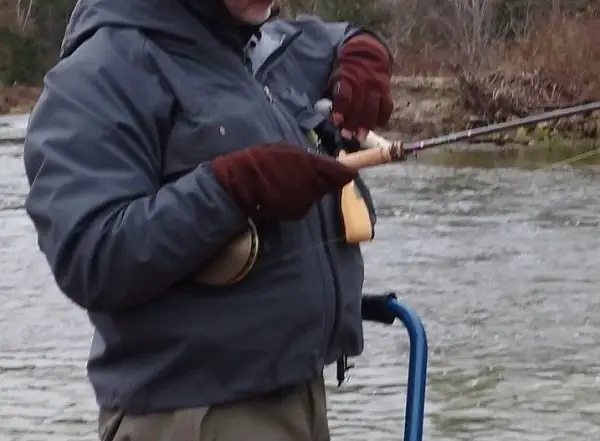
Being able to put your reel further up the handle may prevent the reel from being pressed against your wading jacket or waders when fighting a fish, which could lead to a broken-off fish.
If the reel stops spinning because the reel handle hooks onto a pocket or part of your body, it can stop the float, or worse, it can break off the fish, so a proper reel position is important.
A downside to the sliding rings is that they can loosen, and the reel can fall off, damaging the reel or losing it completely. To be sure this never happens to yo,u and my advice on how to put your reel on properly, visit my page How To Put A Centerpin Reel On.
2 Piece or 3 Piece Rods
Float rods usually come in two or three pieces. I prefer the two-piece rods because they have fewer connection points, which may make the rod slightly lighter, and they have fewer pieces that could accidentally come apart when casting. And two-piece rods break down easier for me.
If you are tight for space in your vehicle, a three-piece rod may be the best rod choice for you.
Remember that a 14-foot rod that breaks down into only two pieces means it is still 7 feet long and that might not fit in small cars or two-seater pickup trucks; therefore, a 3-piece rod may be a better option for you.
Centerpin Rod Pricing Differences
Some of my clients will ask why some rods are $150.00 and some are over $600.00, and what the difference is.
Based on my experience, there are a few differences between cheaper and expensive rods, so before you buy a new Centerpin rod, consider these things:
- More expensive rods have a better bend and power distribution, whereas the cheaper rods may not have the power or backbone in the right places. This can make hooksets less effective and make it harder to manage big fish.
- The more expensive rods have better and lighter components and are made from a higher-grade material, which offers more strength while being lighter. Lighter and stronger are great on those long days on the water.
- Most anglers will tell you that higher-end rods will have a nicer feel when they set the hook and when fighting the fish. Every angler will have a different opinion on the feel of the rod, but in general, the really cheap rods can not compare to the feel of rods in the $250 range and up.
- More expensive rods will be balanced better, and you will find they will not be too tip-heavy or too bulky in the lower section.
- Often, long rods will have what is known as tip sag, but some of the higher-end rods won’t have tip sag, or it will be less sag than the cheaper ones. Tip sag doesn’t really affect the performance or the feel of the rod.
Bonus: As an added bonus, I did some research and put together a list of the most recommended Centeripn and Float Fishing rods from other websites, so you won’t need to go get another opinion. I will include that list and my thoughts on these rods at the bottom of this article.
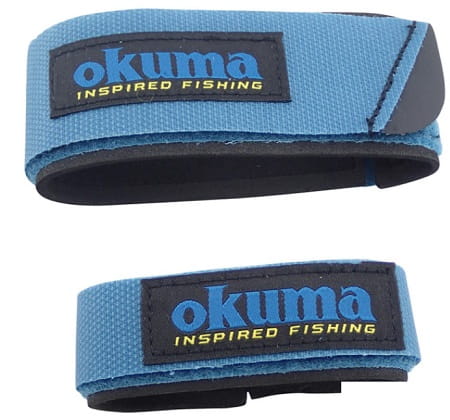
GUIDE TIP: Float fishing rods are long and a pain in the ass when walking through the bush or when putting them in your vehicle.
When I am traveling through the thick bush, I will break my rod in half, which is one reason why I like two-piece rods, and then I like to use cushioned rod wraps like the Okuma Wraps seen in the picture to make sure that all pieces stay tight together and secure, which will help prevent damage.
7 Best Centerpin Rods
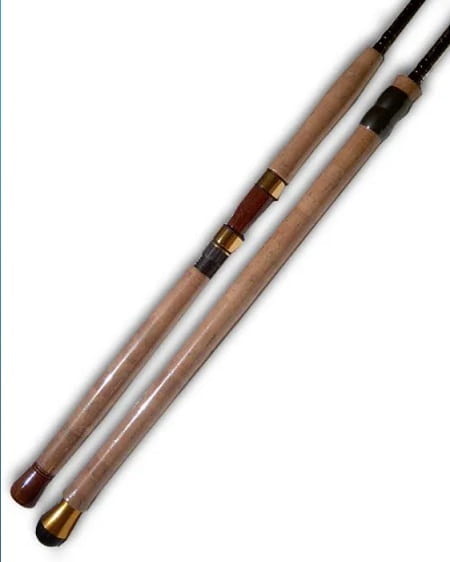
Raven IM8 Centerpin Rod
GUIDES CHOICE
This is my go-to rod for all my guiding and is the rod that I recommend the most to my clients and friends. Of all the rods I have tried, I would say this is the best Centerpin rod for the average angler.
I see this rod on the rivers more than any other rod, and for good reason. It’s durable and one of the best multi-purpose rods that I have used.
I prefer the 13 foot, 2 piece sliding rings model.
Paired with the Raven Matrix Reel with 8lb Raven High Viz Mainline this is a Great setup for beginner and advanced anglers for all around the great lakes region.
Alternate Rod: The Raven IM6 is another great rod that I have used a lot and have guided with. It’s slightly less expensive but does the job and gets great reviews.

Best Under $200.00
Lamiglas Redline HS CenterSpin Float Rod
I used this rod last year when guiding and fishing, and I was impressed.
Lamiglass has been a well-liked rod for many steelheaders, and this one is perfect for anglers who don’t want to spend over $200.00 on a good steelhead rod.
It has a great finish and feels good in the hands when fishing big steelhead.
I like the 13-foot rod with the 4 to 10-lb rating, and I think this is a great rod for most small to mid-sized steelhead rivers.
This rod can be used for steelhead and salmon.
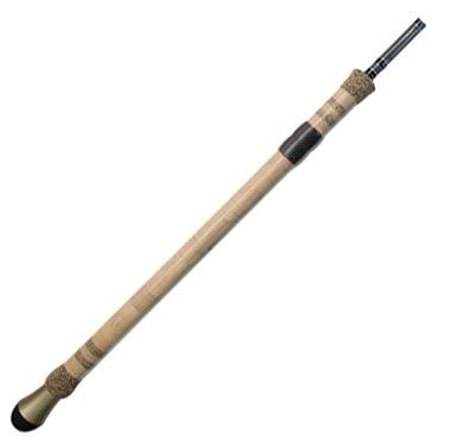
Raven RPX Centerpin Rod
Top High-End Rod
This is one of the lightest and strongest, and possibly the best Centerpin fishing rod on the market. I have used and recommended the 13’6 rod with the sliding rings to many clients.
The medium-light rod with the 4-12lbs rating has lots of power to handle big steelhead and salmon. It has the power for big rivers but is light enough for smaller rivers too.
It comes with REC Recoil guides which are good in the winter and won’t have ice build up as fast.
This rod is built with advanced NANO technology resins, REC Recoil, and Titanium Frame SiC Guides, and is built with RAVEN’s custom tapers. It uses only top-quality components, and it could be the lightest and most responsive float rod on the market.
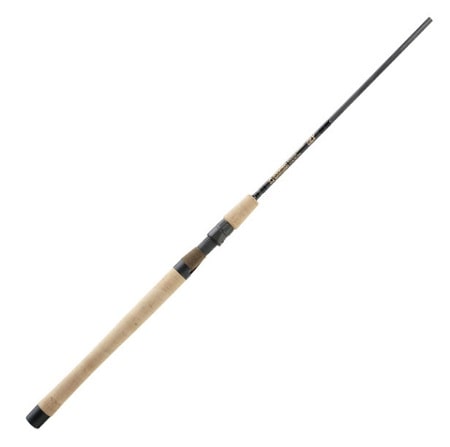
G. Loomis Salmon & Steelhead Centerpin Float Rod
Popular High-End Rod
This is a favorite for many steelhead anglers and is one of the lightest rods on the market. I have used and recommend the 13’6 rod with the sliding rings for most trout and steelhead rivers.
The 13-foot STR1563 GLX CP model is a great all-around rod for anglers who want to fish big steelhead and Salmon on rivers around the Great Lakes region.
The 15-foot STR1803 GLX CP model is a great rod for large rivers with big steelhead and salmon.
There is also a great alternative option for anglers looking for a combo steelhead /salmon rod.
You might need a heavier rod for those bigger salmon too. Therefore, it’s a shorter rod from 11 to 12 feet, but it ranges from Light to Heavy is the G. Loomis IMX-PRO Salmon & Steelhead Centerpin Float Fishing Rod – Check Price.
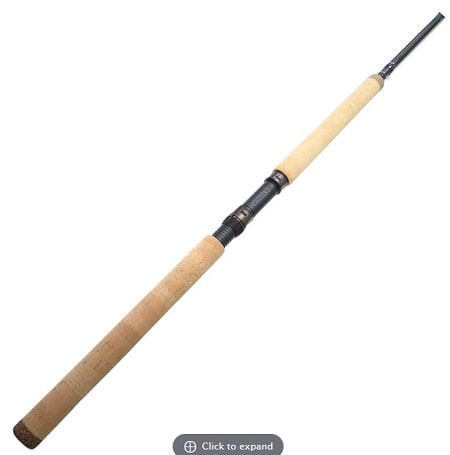
Okuma SST Float Rod
Good Starter Rod
The 13’4 SST Float Rod is a popular economy Centerpin fishing rod for under $150.00, and it gets good reviews from users.
With economy rods, you may get a softer action and a slightly heavier rod, but this rod uses an IM8 blank and is a good rod at this price range.
I have been using the SST spinning rod version for years and like it.
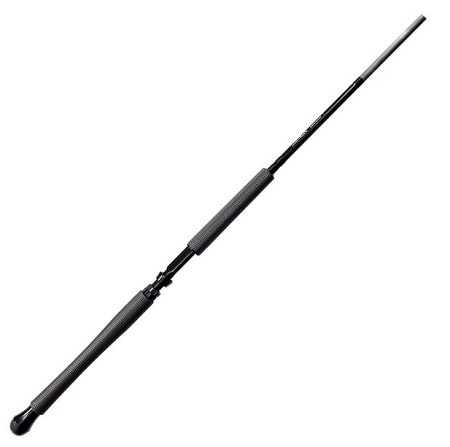
Best 2-piece Rod
Lamiglas The Closer Centerpin Float Rod
This is one great rod and a unique one that many guys love. This rod has plenty of backbone for the big steelhead and salmon of the Great Lakes.
What I liked about this rod was that I felt like my hook sets were better with this rod when compared to some of the other cheaper rods, but it was still great for protecting lighter leaders.
It comes in 2 pieces and has a unique woven handle for better grip. You can also get the handle in fixed or sliding rings.
The 13-foot light model that is rated with 4 to 8 lbs is great for steelhead in small to medium-sized Great Lakes rivers.
The 13-foot Med-light model with the 6 to 10lb line rating is best for steelhead in medium to large rivers and is also good for salmon.
This rod also gets great reviews from users. I prefer 2-piece rods because they are easier to break down; however, 2-piece 13-foot rods mean that even broken down, they are 6.5 feet long, which might be too long for some cars and pickup truck interiors.
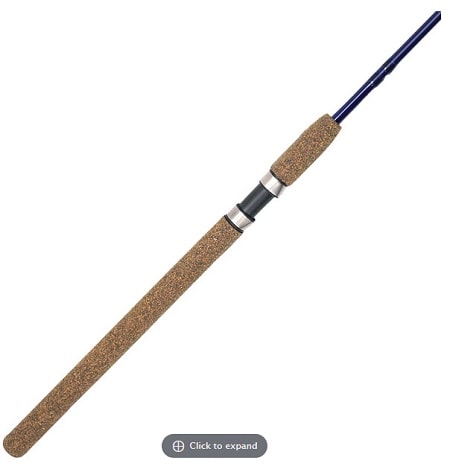
Douglas LRS Centerpin & Float Rod
I have recently tested the Douglas LRS 13’6″ Centerpin and Float rod on some local steelhead streams last spring, and I must say that I am quite impressed with it.
What I really like about this rod:
- high-end components, which results in superior strength-to-weight ratios.
- I found the rod to be well-balanced and lightweight, with excellent sensitivity.
- Hook sets were good even at long distances.
- Fighting and playing fish was really nice on the 13’6 model. It has a great feel to it with just the right amount of flex in the tip and mid-sections.
Check out all the features of the Douglas LRS Centerpin and Float rod and pricing at FishUSA.com
Bonus Rod
In 2024, FishUSA got into the float rod game with a rod that is getting good reviews. This is one worth checking out, especially if you are on a budget under $200.
Perfect for drifting the West Coast rivers and Great Lakes tributaries for salmon and steelhead fishing.
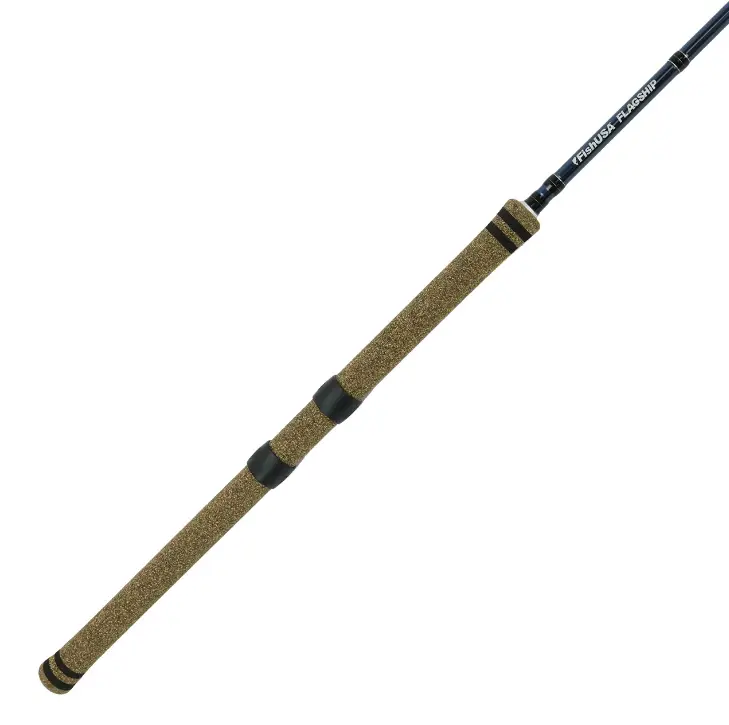
FishUSA Flagship Centerpin Rod
Premium graphite construction: Combines 36 and 24-ton graphite strategically, offering performance comparable to or better than other centerpin rods at any price point.
Durable and lightweight: Features a unique graphite blend for a durable tip section, providing a light yet strong rod capable of handling big fish.
Optimal length: The 12-foot, 2-piece design enhances casting distance and line control for effective bait drifting under a float.
High-quality components:
- Heavy-duty hook keeper: Ensures convenience and reliability.
- Sea·guide Hero Hi-Grade stainless steel rod guides: Marine-grade SS316 guides maximize performance and resist chipping.
- Ground cork handles: Provide exceptional durability and comfort for long fishing sessions.
- Rubber sliding rings: Securely hold your centerpin reel in place.
Elegant design: Finished with a signature dark blue metallic coating, adding a sleek aesthetic to the Flagship series.
Extensively tested: Developed and field-tested by FishUSA float fishing anglers and Pro staff to meet the needs of anglers worldwide.
Warranty: Backed by a limited one-year warranty for peace of mind.
Best Float Rods for Spinning Reels
Some anglers prefer to use spinning reels instead of Centerpin reels, so these rods will work for both spinning reels and centerpin reels.
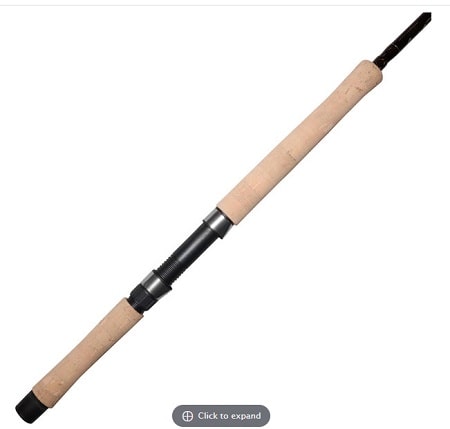
Lamiglas X-11 Great Lakes Float Spinning Rod
Guides Choice
When it comes to finding the best Centerpin fishing rod that is long and designed for float fishing with a spinning reel, this is my favorite. I prefer the 12-foot LX12MLS-M model for most rivers.
There are 2 shorter versions that would be good for casting lures or float fishing.
The Lamiglas X-11 Great Lakes Float Spinning Rod is an excellent steelhead float rod with classic Michigan-style handles that anglers love.
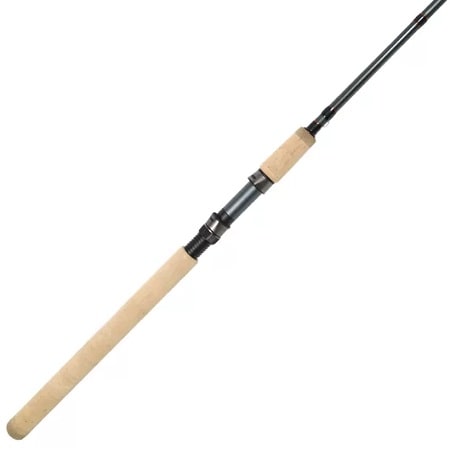
Best Float Rod – Spinning
Okuma SST – NEW GENERATION Spinning Float Rod
The 10’6 model is the one I use for float fishing and for spin fishing with lures on small to medium-sized rivers. It has enough length for float fishing but isn’t too long that you can’t easily throw lures with it.
Okuma SST Salmon & Steelhead Spinning Rods offer technique and species-specific rods with premium IM-8 graphite blanks and components for the ultimate tool in a Salmon & Steelhead rod.
Best Centerpin Combos
After extensive research, I can honestly say that almost all Centerpin fishing rod and reel combos sold online suck! There are a few good options for anglers who want a combo that I discuss on my page, Centerpin Combo – 3 Best Centerpin Combos.
Tight Lines,
Graham
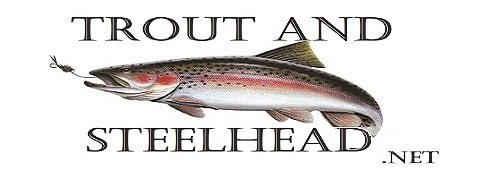
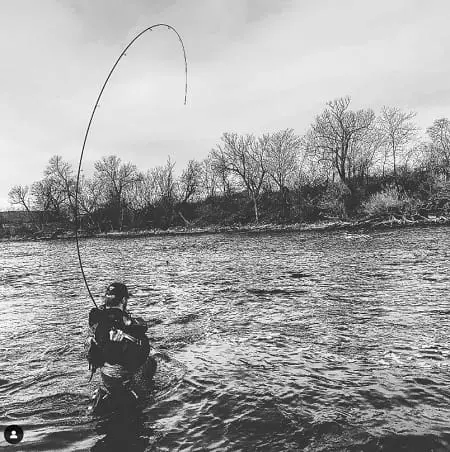
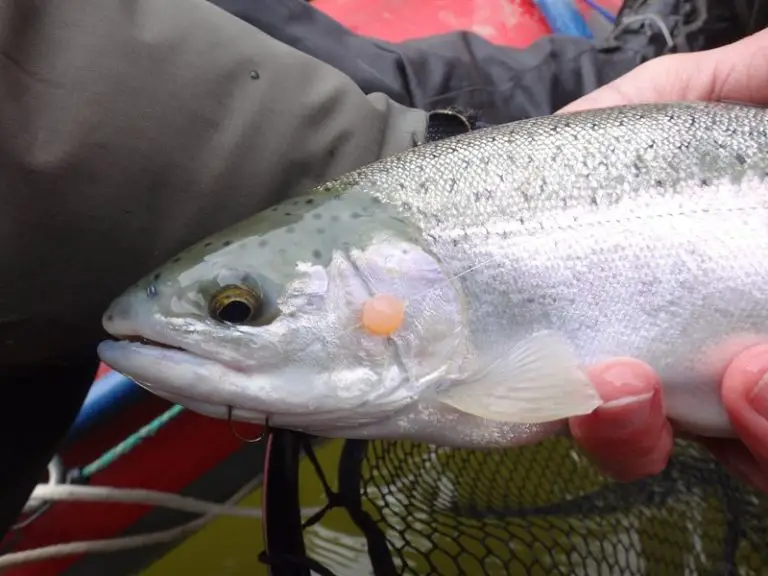
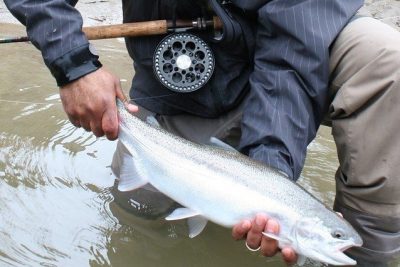
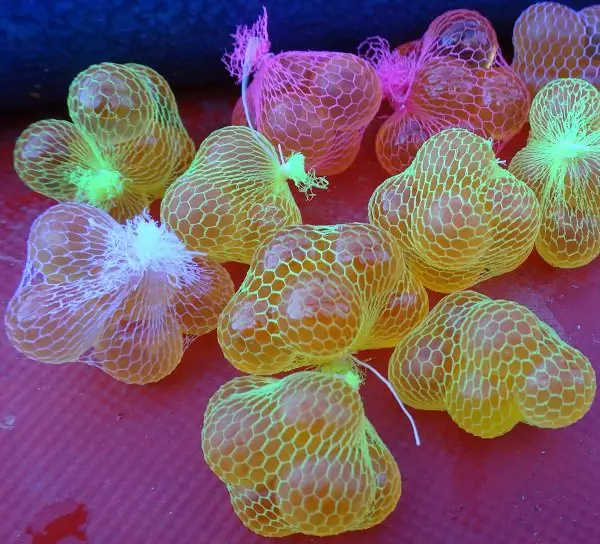
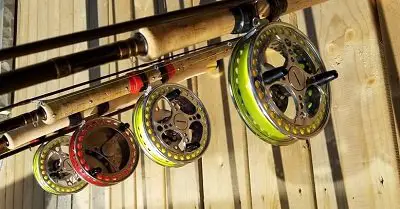
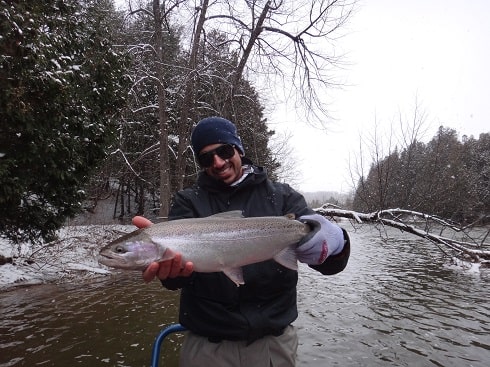
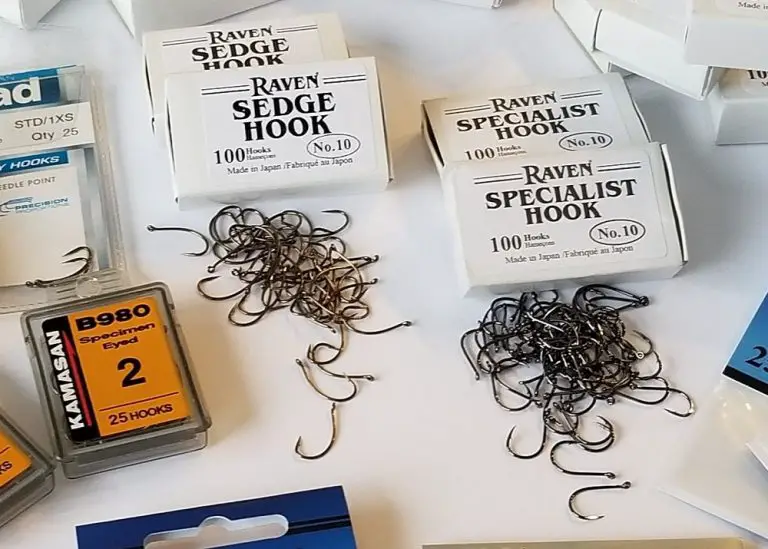
Thank you for sharing.
Very informative. Thanks for the research. I did some of my own but this is all in one place. 8 live in western NY and im going with the lamiglass closer
Hi Kyle, I was using the Closer on Thursday with a client and it’s a great rod. Have fun with it.
This is hands down the best beginner steelhead website! I ended up getting the Raven im8 13 foot rod and love it! It has lots of backbone for bigger fish. My only complaint is it’s a tad heavy compared to some other Rods, but definitely worth the money! Thanks for posting this guide!
Hey Robert, I’m glad you like the website, There’s a lot more to come. You will find that the more expensive rods will be lighter and more sensitive. You can always upgrade. Good luck on the water.
Hi Graham, I want to start out on center pinning and found the stream side custom 13 foot 2-8lb, Any thoughts on this? You posts have helped me a lot but haven’t found any of the rods recommended near me.
Hi Marc, my experience with Streamside rods and Centerpin reels has not been great so I did not include them as a recommended product. I would recommend considering the rods that I do recommend as these rods have been tested, are liked by anglers, and are good rods. You may need to spend a little more but in the long run, I think you will be happier with them.
Good luck.
hi Guys, Have you guys used Sage centerpin rod??
Hi Ray, Sage does not make a Centerpin rod, however, some guys have been taking the sage Spey rod blanks and making them into Centerpin rods and I have used a few of them. I think the first one that I used was about 20 years ago. I liked the ones that I have used and the guys that used them loved them. The downside to getting a custom-made Centerpin rod built with a sage blank or any companies blank is the warranty and replacement issues. Because Sage does not make or stock Centerpin rods, if you break a tip or any part of the rod, it’s not as easy as just pulling a replacement top or bottom off a shelf and then sending it to you. Should you happen to break the rod you would need to get it re-built, which could take months and cost you quite a bit of money.
Hope that helps.
Graham
Hi, Graham,I the Okuma SST is out of stock.What do you think of the Okuma Celilo SST?
Hi Jonathan,
I think both rods are decent rods for their price range. The SST is a slightly better blank which should provide more strength and sensitivity and I prefer using the SST over the Celio. If you can afford the SST or a similarly priced rod I would go with that.
Graham
Hi, What are your thoughts on the Lure jenson legacy float rod?
I haven’t tested it out so I can’t say for sure. Maybe we can get some others that have tried it to let us know. I may test it out this fall and if I do I’ll update the page.
Graham,
Hi there, my name is Milan and I am from Toronto fishing Georgian Bay most of the time for Salmon and Rainbows. Thank you for great introduction on this topic. I want to get into centerpin fishing and understand the pros and cons of it. Therefore you will find link to Cabelas and just to let me know your opinion on this brand. Thank you😀🤟🤙🎣
Hi Milan,
I have not used that rod and reel combo and based on the reel placement on the handle I can’t recommend it. I would need to try it out before I could give you my honest opinion.
what a bunch of hokey, I’ve been a center pinner for 42 years, I use a RIVERMEN,10’8″COMES WITH 2 DIFFERENT WEIGHT tips, I can fish any river, the fish are on the edges, not in the fast middle flow, why do I have to have a rod I can reach the other side of the Negara river with. just hokey to sell rods
Hi Dan,
Long rods have many benefits and are the preferred choice of the best anglers and most river guides, but if your 10’8 rod works for you and you’re happy with it, then go have fun with it. It may sound hokey to an old dog like you, but there is a very good reason why most river guides use longer rods to Centerpin with.
For your Info: Long rods help with controlling the float by keeping the line off the water for longer as your float gets further down the river, long rods help with increased casting distances, long rods also act like a shock absorber to help protect light lines and light leaders, and long rods aid in fighting and landing fish, especially big fish,long rods can also help keep the line out of the rocks when the fish runs way down the river and into the shallow rapids and rocks.
I know a lot of really good river guides, and they all use 12 to 14 foot rods for those reasons, and they will only drop to 11 foot or shorter rod on small rivers.
And NO, the fish are not always on the edges, I’m sure I have seen a few thousand steelhead, salmon, and trout caught in the middle of the river or on the far side, it depends on the rivers, depends on the flow, and depends on the depth.
Good luck Dan.
I am also an old dog in 1983 I tied my 13 foot im6 Garry loomis float rod because I was sick of getting my butt kicked by the guys who fished with them . In those days you had to build your own . My float reel is the same vintage , an L.G. custom reel no clicker just a rubber band . I fish this setup every year since . Guess what ? Everyone has one now!! Go figure. Your information is top notch keep it up.
If I want to buy 1 and only 1 centerpin rod and not be looking to upgrade next year for great lakes steelhead / browns etc. what 13′ rod am I buying?
RPX or Closer?
At times I wonder if a 10 lb rated rod can turn fish when they get into the current.
RPX states 4-12 lb line yet only up to 3/8 oz wt.
Closer blanks 6-10 lb 1/4-1/2 oz.
Or closer at 12′ 6-12 lb.
Don’t see myself using 1/2 oz. or above floats
Thanks
Dave
Hey David,
There are a lot of guys that love their closer rod, and that love their RPX, and just as many that love their Loomis GLX. All great rods. If you are worried about turning big fish in faster currents and if you are using heavier leaders, go with the RPX. If you’re fishing smaller great lakes tribs, the closer with the 10lb rating is a good option.
I tend to go lighter than heavier most of the time.
Hope that helps.
Graham
Thank you,
Tough making a expensive purchase without ever having handled one of them
13′ – RPX – sliding rings is on the way.
Do you feel the larger diameter centerpin reels Example – Colville 535 or other brands at 5 1/2″ are too much reel for this rod?
Too much weight.
Large diameter up to 5 1/2″ seem to be gaining in popularity.
Leaning towards 5″ to 5 1/8″ Diameter reels.
Nope, not at all. That rod will handle any centerpin reel on the market. Enjoy the rod.
Graham
Received my 13′ RPX today – seem like maybe a bit much – heavier power than I was seeking. as a steelhead / salmon rod – I think it would excel. Again tough buying sight unseen – gets expensive buying – sending back – not having hands on 2 or 3 to compare.
But thanks for the advise in all of your areas. Ever fish a Nova 13′ – centerpin rod?
Hey I was wondering if you have any experience with nova rods.
I don’t as of yet, but I’m hoping to try them out this year. When I do I’ll give you my honest opinion.
Graham
Good afternoon Graham,
For the Raven IM6 Float Rod 11ft 6in medium light power. I’m not sure if this is too much power for float fishing trout in Ga? It is mostly stocked trout but biggest one caught in the Chattahoochee river here was close to 20 lbs. I like this rod a lot, can I please have your opinion on this ? Thank you in advance looking for ward to hearing back.
Faruk
Hey Faruk,
When buying a rod, I wouldn’t consider the largest trout in the system, I would consider the average trout in the system since 90% of the time that is what you will be using the rod for. I’m sure you could land a 20-pound fish on that Raven rod if you have patience, a leader heavy enough to land a 20-pound trout, and some luck on your side 😉
Honestly, the IM6 Med-light is a strong rod that will handle 3 to 10-pound steelhead, and therefore it might be more than you need if the trout in your river system are mostly under 3 pounds, however, it will do the job. The issue is finding a light or ultra light 10+ foot rod for smaller trout that’s not super expensive. I’m still looking….
Hope that helps,
Graham.
Hi graham do you recomend the okuma sst centerpin rod for the nottawsga river near the mouth of the pine river thanks
I’d go with a 13 footer anywhere on the river from Alliston to the mouth. I’ve had clients use shorter rods like the SST around Baxter and it worked, however, my preference is a 13 or 13’6″.